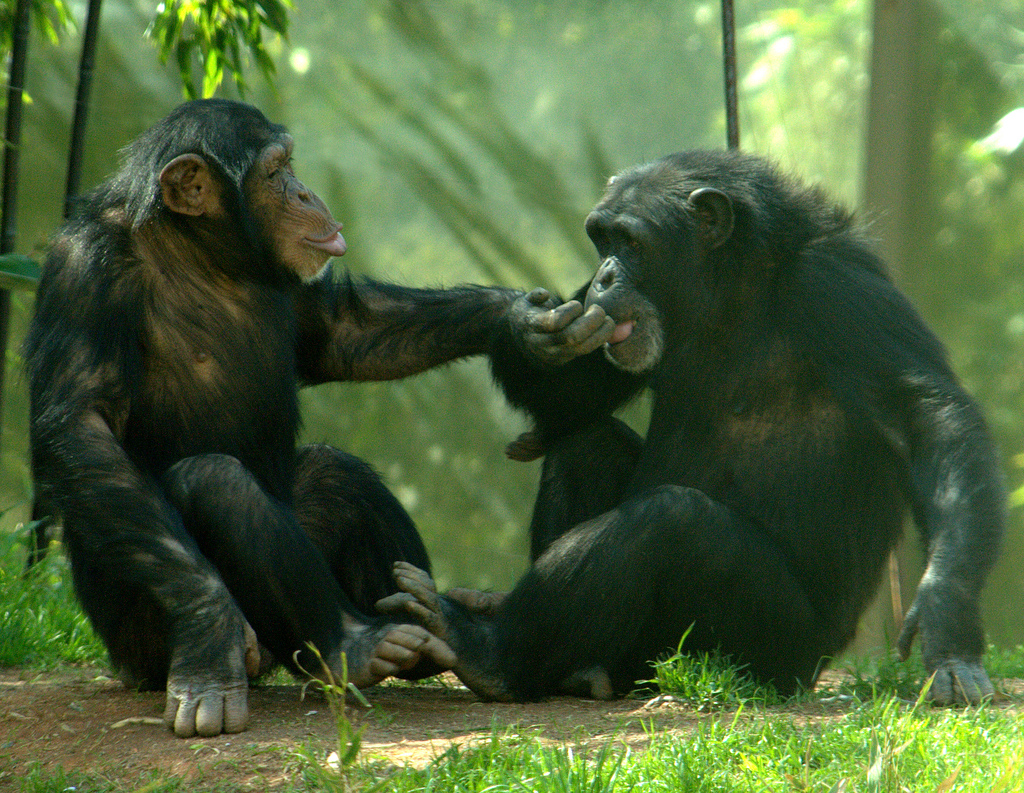 Evolution & Behaviour
Evolution & Behaviour
Chimpanzees Trust Their Friends

Human friendships are often characterized by preferential intentions and attitudes including trusting expectations of close social relations. Humans largely trust only their friends with crucial resources or important secrets. In this study, we investigated whether chimpanzees show a comparable pattern and extend trust selectively toward those individuals they are closely bonded with.
A large body of research shows that chimpanzees cooperate with each other in a wide variety of contexts including grooming, meat-sharing, group-hunting, and communal border patrols. Many different psychological mechanisms might account for such collaborative behaviors. For example, chimpanzees may cooperate with dominant individuals out of a fear of being punished. Alternatively, chimpanzees might show trust-based cooperation, i.e. chimpanzees might cooperate because they expect their partners to behave in ways that are consistent with their welfare. In other words, they might cooperate because they expect their partners to be trustworthy.
In short, while chimpanzee cooperation is well-established, the mechanisms underlying such behaviors remain poorly understood. As trust is the bedrock for human cooperation in many cases, we investigated whether the same might be true for one of our closest living relatives.
To do so, we adapted the human trust game (used mostly by behavioral economists) for chimpanzees. In our version of the trust game, two chimpanzees participated, a truster and a partner - sitting opposite each other in two different rooms. Trusters could either pull the trust-rope or the no-trust rope - they had to make a choice. Pulling the no-trust rope resulted in immediate access to a small amount of food. Pulling the trust rope resulted in a large food box moving to a partner. The partner could then eat half of the contents of the food box (a large amount of food) and then either prove trustworthy by sending the other half back, or prove untrustworthy by not sending it back. So the no-trust option is safe but contains only a small amount of food. The trust option, on the other hand, is risky but potentially has high-payoffs (a lot of food). The trust option is risky because the partner might not send the food back, leaving the chimpanzee empty-handed.
Chimpanzees made a choice between pulling the trust rope and the no-trust rope in twenty-four consecutive trials. In half of these trials, they interacted with a friend, in the other half with a non-friend. Social relationships were determined prior to the study by observing naturally occurring cooperative behaviors. Based on 352 hours of observation of such behaviors as grooming and eating together, we determined for each chimpanzee a friend and a non-friend.
The main finding of the current study is that chimpanzees were much more likely to pull the trust rope when they interacted with a friend compared to a non-friend. Chimpanzees, like humans, thus seem to trust their friends more than their non-friends.
A second finding of the current study is that, if trusted, friends and non-friends are equally likely to prove trustworthy (by sending the food back). This is surprising because chimpanzees still trust their friends significantly more than their non-friends. This is an unexpected finding as it suggests that chimpanzees do not regulate their behavior toward friends exclusively as a function of received rewards. Instead, they seem to form deep emotional bonds with their friends which are, at least to some extent, independent of short-term payoffs. Close relationships thus do not seem to be based on short-term forms of reciprocity but on more long-term and emotion-based mechanisms - a pattern that can be observed in human friendships as well.
These findings suggest that trust within closely bonded dyads is not unique to humans, but rather shares evolutionary roots with the social relationships of our closest primate relatives. Human friendships do not represent an anomaly in the animal kingdom. Other animals, such as chimpanzees, form close and long-term emotional bonds with select individuals. These animal friendships show important parallels with close relationships in humans. One shared characteristic is the tendency to selectively trust friends in costly situations.
Original Article:
Engelmann JM, Herrmann E. Chimpanzees Trust Their Friends. Current Biology. 2016;26(2):252-256. doi:10.1016/j.cub.2015.11.037.Next read: Our internal fight against loneliness by Gillian Matthews
Edited by:
Massimo Caine , Founder and Director
We thought you might like
The lingering effects of parental care and its role in evolutionary change
Jan 27, 2016 in Evolution & Behaviour | 4 min read by Rebecca KilnerLab-life: the afternoon siesta of the fruit fly
Jul 13, 2016 in Evolution & Behaviour | 3.5 min read by Edward GreenAmoebas trap bacteria using nets of DNA: the same mechanism as human immune cells
Jan 27, 2017 in Evolution & Behaviour | 3.5 min read by Lukáš NovákMore from Evolution & Behaviour
Cicada emergence alters forest food webs
Jan 31, 2025 in Evolution & Behaviour | 3.5 min read by Martha Weiss , John LillSize does not matter: direct estimations of mutation rates in baleen whales
Jan 29, 2025 in Evolution & Behaviour | 4 min read by Marcos Suárez-MenéndezThe Claws and the Spear: New Evidence of Neanderthal-Cave Lion Interactions
Jan 22, 2025 in Evolution & Behaviour | 3.5 min read by Gabriele RussoA deep-sea spa: the key to the pearl octopus’ success
Jan 20, 2025 in Evolution & Behaviour | 3.5 min read by Jim BarryFeisty fish and birds with attitude: Why does evolution not lead to identical individuals?
Aug 31, 2024 in Evolution & Behaviour | 3 min read by Lukas Eigentler , Klaus Reinhold , David KikuchiEditor's picks
Trending now
Popular topics


